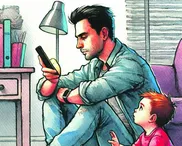Numbers are down. This is a nationwide observation about people applying for ministry apprenticeships, training courses, and responses to church job adverts. The question is frequently asked: ‘Where are the next generation of leaders for the church in the UK?’
We have never had more access to gospel resources: courses, online teaching, excellent conferences, and sermons downloadable at the touch of a button, so why are we not producing disciples who are ready to take on more responsibility, try new ministries, or move to other parts of the country to spread the gospel? Why do so many want to stay in the safety of their known church family and not have the confidence to consider more radical alternatives?
When I was five, I walked to school on my own. It was a 15-minute walk involving crossing roads, including one major road (there was a lollipop man at that crossing!). Sometimes, I cycled the route. It was not considered inappropriate – my parents were working, and there was no other option. Today social services would be called, but developing early independence was normal back then. I played outside with friends, explored the local coastline, and walked the dog without adult supervision. Adults largely left children to get on with things. Modern childhood is very different: parents are much more present, but parenting is a daunting task today. There is conflicting advice and pressure for perfection from pregnancy onwards. Every aspect of a child’s life is analysed, organised and documented from day one. Timetables are very full – adults very present. Yet ironically, these cosseted kids are not thriving, and levels of anxiety in our pre-teens and teenagers continue to rise. They have the strange experience of the hyper-involved protection from their parents alongside the invasive presence of the internet with all its attendant ugliness existing side by side in the spaces where they should feel safest: it is not surprising many feel insecure. The work of psychologists such as Jonathan Haidt in The Coddling of the American Mind has shown how our parenting has not helped children learn to be resilient. Stella O’Malley, the author of, among other things, Cotton Wool Kids, describes our culture as having a type of ‘toxic empathy’ – young people are encouraged to pathologise their distress at the harshness of this world. Growing up in today’s world is complex, despite myriads of advice, books and websites.








What the aged know that the young must learn
“I don’t feel any different - I can’t believe I’m 90!”That comment - with varying changes to the number …